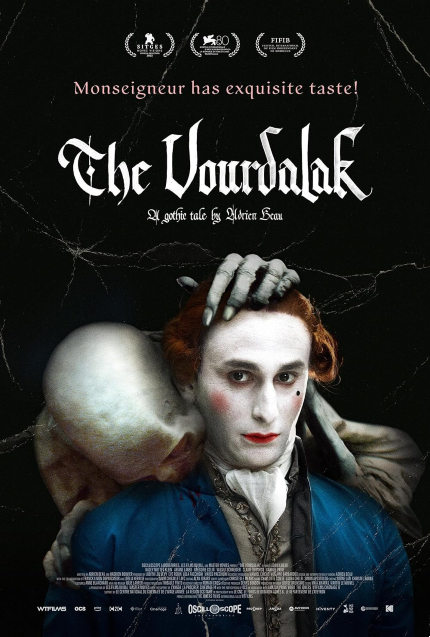Chattanooga 2024 Review: THE VOURDALAK Delivers a Different Kind of Vampire Tale

Long considered the ur-text for the depiction of vampirism in fiction, Bram Stoker’s Dracula may be the most influential (the “trope-creator”), but it was far from the first.
Sheridan Le Fanu's 1872 novel, Carmilla, preceded Stoker’s by more than two decades, but even Le Fanu’s novel doesn’t qualify. That title likely falls to Aleksey Konstantinovich Tolstoy’s (Tsar Boris, Tsar Fyodor Ioannovich, The Death of Ivan the Terrible) lesser-known 1839 novella, The Family of the Vourdalak, The Vampire.
Direct adaptations of Tolstoy’s novella have been few and far between, first as part of Mario Bava’s 1963 anthology film, Black Sabbath, and later as The Night of the Devils 11 years later. Both took liberties with Tolstoy’s novella, leaving a faithful – or more faithful – adaptation up for grabs.
That, in turn, takes us to writer-director Adrien Beau and his visually, narratively, and thematically impressive adaptation, The Vourdalak. Shot on Super 16mm, The Vourdalak looks like almost nothing else, like a long-lost film from another bygone era recently unearthed in a time capsule.
A vampire story unlike all or most, The Vourdalak centers on Marquis Jacques Antoine Saturnin d’Urfe (Kacey Mottet Klein), a mid-19th-century French envoy who, having lost his possessions and more importantly, his horse somewhere in the Eastern European wilds, finds himself relying on the kindness of strangers, a precarious ask for a foreigner in a foreign land, especially for someone who looks and sounds like the marquis. A dandified, effete fop in powdered wig and pounds of white makeup, the marquis resembles nothing more than a ghost from another time or an alien from another planet.
Overly impressed with himself and his place in the social, cultural, and political order of the day, the marquis assumes everyone he meets will both agree with his personal assessment and act accordingly, if not catering to his every need or whim, then at least ensuring he obtains a horse and provisions for his continuing journey away from the civilization and rationality of Western Europe and toward the barbaric, superstitious East. Not surprisingly, his encounter with the title character will test his presumptions and assumptions about science, reason, and rationality.
Almost immediately, the marquis takes refuge with an extremely peculiar family led by two brothers, Jegor (Grégoire Colin) and Piotr (Vassili Schneider), the latter’s wife, Anja (Claire Duburcq), their preteen son, Vlad (Gabriel Pavie), and Jegor and Piotr’s sister, Sdenka (Ariane Labed). Their temporary hospitality comes with an ominous warning: The family’s patriarch, Gorcha, left almost a week earlier to extract revenge from Turkish pillagers aligned with the Ottoman Empire.
If he doesn’t return by a certain date and time, Gorcha has informed his family to assume the worst, not he perished in his pursuit of revenge, but that he has been transformed into a Vourdalak, a vampire who targets those bound to him by love or biology. If the latter, under no circumstances should the family welcome him back home.
While the marquis takes increasingly obsessive carnal interest in the exotic (to him) Sdenka, the already fractured family begins to disintegrate once Gorcha, appearing far, far worse for wear, returns home, claiming he’s still among the living and the family order restored (i.e., with himself as the head). He’s anything but alive, resembling an emaciated, pale-skinned corpse thirsty for the kind of sustenance only a family member can provide. More observer than participant, the marquis finds himself in an impossible position, his worldview, once fixed and legible, now clearly, irreparably broken, the only path ahead blocked by his undead host and his ever-growing cohort.
Tolstoy’s novella ended on a conventional note, his hero, life-lesson in hand and the social order restored, saved from certain death through cunning, guile, and sheer luck. Beau chooses an arguably far more fascinating, provocative conclusion to his tale, offering a seemingly secondary character the agency and autonomy 19th-century society in all or most forms denied her.
The Vourdalak played at the 2024 Chattanooga Film Festival. It opens today, only in theaters in North America, via Oscilloscope Releasing.
The Vourdalak
Director(s)
- Adrien Beau
Writer(s)
- Adrien Beau
- Hadrien Bouvier
- Aleksei Tolstoy
Cast
- Kacey Mottet Klein
- Ariane Labed
- Grégoire Colin







